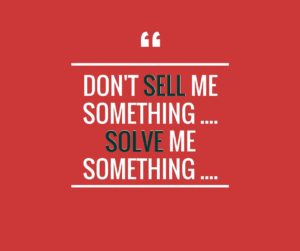We all have been there; you pick up the phone and someone is instantly trying to sell you something. Of course, you will probably politely decline and hang up – but why? It’s natural to be skeptical of a sales pitch whether they’re calling or knocking on your door. A recent study by Salesforce® found that 79% of business buyers say it’s absolutely critical or very important to interact with a salesperson who is a trusted advisor
The solution to this problem is not on the consumer’s shoulders, salespeople must work to build a reputation of trust and reciprocity if they wish to be successful. If you are experiencing more hang-ups or rejections than normal, it’s time to re-evaluate your sales process.
Trust is important to people in all aspect of life, and making the decision to make a purchase requires a lot of trust. According to a study done by Hubspot, only 3% of prospects trust sales reps.
How do you earn consumer’s trust? We’re glad you asked! We have gathered seven techniques to help establish a relationship of trust between the seller and consumer and hopefully close the deal!
-
Don’t start the call with an immediate pitch
Easing into the sales pitch is a more effective way to gain trust and close the deal. This can be done by starting with a story, humor, or trying to get to know the prospect. Making the individual feel more comfortable and ready to hear about what you have to offer is the first step in building a trustworthy seller-buyer relationship.
-
Provide case studies or customer references that will resonate
Customers are your best advertisers, especially happy ones. You can pitch your product to a client all day and they may not believe in you or the product. On the other hand, having a current customer speak to the usefulness of your product will make a bigger impression on your prospect. This shows that you are being truthful about the fit of your product while also demonstrating that your current customers have as much faith in what you’re selling as you do.

-
Utilize your marketing materials to your advantage
Utilizing blog posts, Ebooks, and white papers help establish your place as an expert on your product. This goes back to utilizing your current customers as a reference. Case studies help support your product while also allowing you to use a customer as a reference. Often without having to constantly ask them. It is important to remember to provide context to the content that you are showing. Make sure what you are giving prospects is tailored to their pain points. This exemplifies the fact that your product has solved issues similar to theirs in the past, and is capable of doing so again.
-
Don’t be afraid to ask to get back to them
If a prospect is asking about something you don’t know the answer to its important to be truthful. Making up answers will only lead to false promises with no follow through. This can cause the loss of a customer in the future, or the deal falling through when they realize you made information up. Instead, be honest! Let the prospect know that you do not have the best answer for them at that particular point in time but you will get it to them ASAP. This establishes your credibility while ensuring they are being given the correct information.

Ask them how you can help – don’t assume you know
One of the reasons people dislike sales pitches is because people dislike being lectured. Instead of going into detail about all the problems that your product can solve, ask them what their pain points are and what they are looking for in a solution. This helps tailor your solution and offerings to their specific needs, making prospects feel that the process is more personalized. It also prevents you from wasting time on explaining things that the prospect won’t necessarily care about.
-
Build a relationship
If you focus on building a relationship rather than making a sale, you’ll be surprised at how much faster the sales process can go. Prospects who feel a personal connection are more likely to believe in your product and, therefore, make a purchase. As an added benefit, this can translate into prospects becoming a cheerleader for you to their decision makers, accelerating the sales process even further. After the sale is made, the now client will be more likely to provide success stories in the future as they may feel that they owe you a favor.
-
Deliver on your promises

Saving the most important for last, don’t make pricing promises (or any other promises for that matter) that you know you won’t be able to keep. Although this may seem like a good way to make a sale, empty promises will only deter clients when it comes down to making the decision. Being honest about negotiation points that you know you can’t provide will let the prospect know that you are trying to get them a good deal and further build a trusting relationship.
Salespeople should always be looking for ways to better themselves and their processes. One, often overlooked, way to do so is by striving to establish trust in seller-buyer relationships. Getting that 79% of buyers who prioritize trust can greatly impact revenue and help reach sales goals. This not only gives that sale a better chance of going through, it also establishes a long-term relationship that can be mutually beneficial.
[su_button url=”https://get.leveleleven.com/l/672783/2019-01-03/lb” target=”blank” style=”flat” background=”#E84E38″ color=”#ffffff” size=”8″ center=”yes” radius=”round”]Request a Demo![/su_button]



